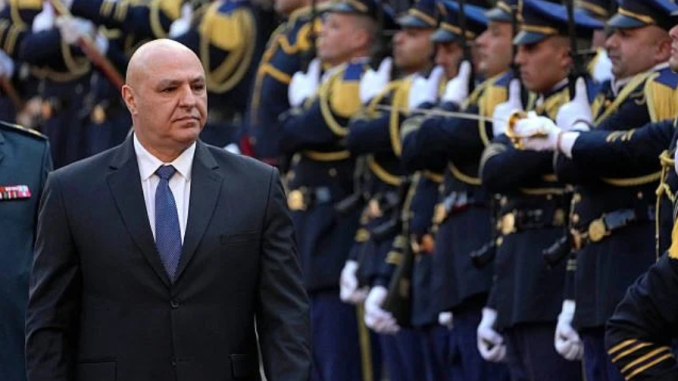The Iran-backed militia is bowed but not broken – and it could still find a way to hijack Saudi funds for its own rehabilitation
Hussain Abdul-Hussain | Jan 10, 2025
 Newly-elected Lebanese President Joseph Aoun reviews the honor guard upon his arrival at the Lebanese Parliament to be sworn in as a new president, in Beirut, Lebanon, Jan. 9, 2025. (AP/Hussein Malla)
Newly-elected Lebanese President Joseph Aoun reviews the honor guard upon his arrival at the Lebanese Parliament to be sworn in as a new president, in Beirut, Lebanon, Jan. 9, 2025. (AP/Hussein Malla)
Israel’s military success in Lebanon and the strings Gulf patrons attached to reconstruction money forced Hezbollah to cut its losses and acquiesce to the election of a president it had vetoed for 802 days: Lebanese Armed Forces Commander Joseph Aoun. The new president promised the state would hold the monopoly on arms – code for disarming Hezbollah – and vowed “positive neutrality” in the Arab-Israeli conflict, signaling a return to the 1949 truce with Jerusalem.
In his swearing-in speech, Aoun promised “a state that invests in its army to fight terrorism and prevent Israeli aggression on Lebanese territory.” Hezbollah’s Al-Manar TV, posted Aoun’s statement on its website.
The untrained ear might take umbrage at the reference to “Israeli aggression,” in connection with a war Hezbollah launched against the Jewish state “in support of Gaza,” on November 8, 2023. But within Lebanon, dislike of Israel is the norm. The division is over whether the state or the Hezbollah militia deals with Israel’s imagined animosity, and whether it is dealt with through diplomacy or war.
The last time Hezbollah got an Aoun elected president – Michel in October 2016 – the former president said in his inaugural speech: “On the conflict with Israel, we will spare no effort or withhold any resistance to liberate the remaining occupied Lebanese territories and protect our homeland from an enemy that still covets our land, water, and natural resources.”
Today, Hezbollah chief Hassan Nasrallah has been eliminated, and with him, the words “resistance” and “liberation” are gone from the presidential speech. Lebanon is back to debating “positive neutrality” – Lebanese lingo for reviving the 1949 UN General Armistice Agreement, whose ultimate goal, per UN Security Council Resolution 62, is “to facilitate the transition from the present truce to permanent peace.” This agreement kept Lebanon out of major regional conflicts including the wars of 1967 and 1973.
For good measure, the new Lebanese president also promised to combat money laundering and smuggling, two of Hezbollah’s main income sources.
Lebanon is on the right track but it’s not out of the woods yet. Hezbollah is planning a comeback, although first, it must placate its own followers’ fury. In the aftermath of the war, Lebanon’s southern residents lost 40,000 homes, with 60,000 units damaged. The Iran-backed militia promised to refund everyone for everything but ended up cutting checks for $50 and $72 drawn against its destroyed and broke Qard al-Hassan bank.
Hezbollah needs the Lebanese state to come up with the money. The Lebanese government, for its part, relies on Gulf largesse. After Saudi Arabia summoned Aoun and extracted guarantees that he would disarm Hezbollah, Riyadh deployed its emissary to Beirut, where he spent the days leading up to the election lobbying for Aoun’s election.
Not dead yet
With Saudi money dangling, Hezbollah conceded, but choreographed its change of heart carefully. For starters, the militia flexed its muscles to show who’s boss in parliament. In the first round, Aoun failed to secure a majority – in the second round, the Shia bloc of Hezbollah and Speaker Berri voted for Aoun, whose end tally stood at 99 of 128 votes.
With its 28 votes, the Shia bloc hopes for a share in the upcoming cabinet. Berri will likely keep the finance portfolio, which will be instrumental in disbursing money to the angry Shia base. Even the chief of Hezbollah’s parliamentary bloc, Muhammad Raad, sounded tame. “By voting for his excellency President Aoun, we wanted to send a message that we are the defenders of national consensus in this country,” Raad said, adding that the spilled blood of Nasrallah and “all the martyrs” made this possible.
A famous Arabic poem reads: “If you see the lion’s teeth, do not assume he is smiling.” The verse perfectly describes Hezbollah today: Tired, wounded, and broke, but not dead yet. For now, Hezbollah is focused on rebuilding its non-military side. It will certainly try to preserve and rearm its militia when everyone loses interest in Lebanon and stops looking.
In the interim, it is incumbent on the Lebanese to grab this opportunity to disarm Hezbollah, restore state sovereignty, and reform. If the economy starts growing, the natural next step would be to think more of national interests and sue for peace with Israel.
While it’s off to a good start, Lebanon must not start counting its chickens before they hatch. The upcoming cabinet lineup will be another sign. Finalizing the ceasefire with Israel is yet another. All of these are baby steps that we are watching in hopes that the baby can finally walk. The fear is that Hezbollah might, again, knock it back down.
Hussain Abdul-Hussain is a research fellow at the Foundation for the Defense of Democracies (FDD), a non-partisan organization focused on national security and foreign policy.



https://www.jewishpress.com/news/middle-east/hezbollah/lebanon-army-aiding-hezbollah-weapons-found-on-israeli-border-as-ceasefire-deadline-approaches/2025/01/22/